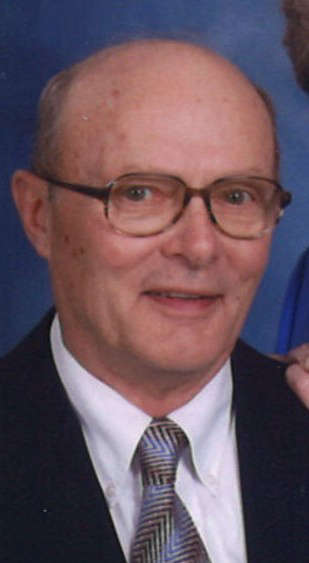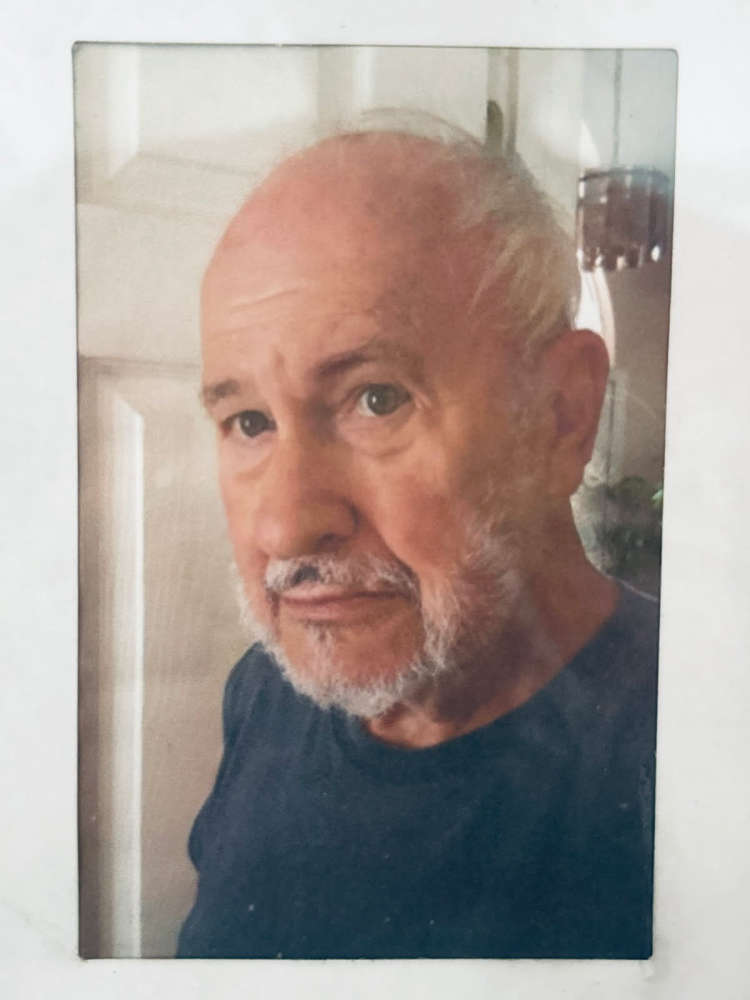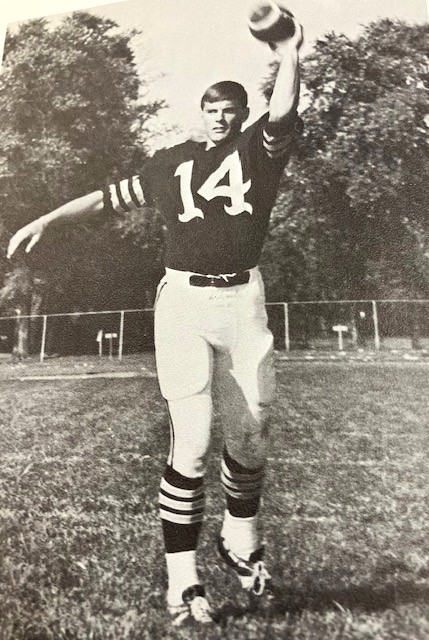
cancer-took-one-shelbyville-finest-athletes-before-graduation
Before the advent of turf fields, class football, postseason gridiron tournaments and round-the-clock sports coverage, Shelbyville had Ron Winton.
The six foot, three-inch quarterback (photo) served as the field general for Golden Bear football squads for two years, including 1967, one of the best seasons in school history.
The Beatles had released their seminal Sgt Pepper’s Lonely Hearts Club Band album over the summer. Lyndon Johnson was President and the Vietnam War cast a pall over the nation. But on Friday nights in the fall, Shelbyville sports fans could leave the problems of the day behind and escape into a world of Golden Bears football prosperity.
Winton led the Golden Bears to an 8-1 record that year and was the top passer in the South Central Conference. He was selected to the 22-member All-Conference Team and was chosen to participate in the 1968 Shrine Bowl which featured the state’s top high school football players.
The exuberance that defined Shelbyville’s incredible 1967 football season was dulled by Winton’s cancer diagnosis late in the season and his subsequent untimely death on Feb. 21, 1968.
Significant medical progress in cancer treatment has resulted in consistently and dramatically improved survival rates over the course of the past six decades. Unfortunately, in 1967, therapeutic options were limited and Ron succumbed to the disease three months before his scheduled high school graduation.
Winton was the quintessential 1960’s star athlete: Handsome, skilled, big, strong, and humble; a quiet individual whose performance spoke for itself. His exceptional athleticism and diligent work ethic were the fundamentals in his prescription for success.
“Ron was a physical specimen,” said teammate and fellow All-Conference selection Fred Avant. “He could throw a football 70 yards and was big and strong so he could run when he had to. He was so gifted that he rose to a higher level at whatever he had to do.”
“You really had to see him to realize just how imposing he was,” said John Cunningham, a junior teammate of Winton’s and the 1968 McKeand Football Award recipient. “He was also a tremendous baseball player. I caught for him when we played on the same team in the Twilight League for 14- and 15-year-olds. He threw so hard that I would put a pad in my catcher’s glove for extra cushion. He received a great deal of interest from college football coaches but he would have excelled in college baseball as well.”
Golden Bears football struggled through some tough seasons in the early 1960s, but it was evident that the program was building.
“We could feel the momentum and Coach Sells had us believing that we could be very good with each succeeding year,” said Cunningham.
Tom Sells assumed SHS head football coaching duties in 1965 and posted three wins against five losses and a tie that first season. The Golden Bears won five games the following year including blowout victories in the season’s final three games, outscoring Rushville, Franklin and Aurora by a cumulative score of 98-20.
The potent running attack was gaining confidence with each game and finished with 694 total rushing yards in the final two games of 1966.
Winton was utilized primarily as a facilitator and runner his junior season as the Bears kept the offensive game on the ground for the most part. In 1967, he would be surrounded by an abundance of talent in all areas and focused on becoming a more effective passer. The improvement in Winton’s passing game was an important component in taking Shelbyville football to a higher level in 1967.
That 1967 football team benefitted from a combination of numerous positive elements. Sells was a relentless taskmaster who pushed a team he knew had tremendous potential.
The linemen corps was strong, talented, and experienced and included Wes Miller, Bill Heck, Steve Platt, Mike Platt, John Chesser, Dave Zerr, Larry Lewis, Jim Ranochak and Doug Wood.
The skill at running back amounted to once-in-a generation talent. Avant and Rich Brown, regulars from the previous year at the fullback and halfback positions, were supplemented by wingbacks Cunningham and Kent Lockman and back-up Steve Dake.
“We had so much depth on the team that John Chesser moved from running back to the line in 1967 and became All-State,” said Avant.
A further indication of the widespread talent of the 1967 Golden Bears is the fact that its senior co-captain linebacker Mark Thomas suffered a broken leg in the jamboree and missed the entire season.
And there was Ron Winton. He had proven himself a capable quarterback the previous year as a junior, however no one could have foreseen the remarkable success he would achieve as a passer in 1967. The senior signal caller routinely hooked up with wide receivers Steve Zeller and Dennis Danner to establish a solid passing game and spread the aerial wealth by also regularly completing throws to Brown, Cunningham and Lockman.
Shelbyville opened the season at home with a 27-25 come-from-behind victory over Anderson Madison Heights. Brown rushed for two touchdowns in the fourth quarter, including the game-winning score on a 4-yard run with only seconds remaining. Winton (photo, with center Larry Lewis) passed for 185 yards and had a 16-yard touchdown throw to Danner in the second quarter.
Shelbyville squeaked out another victory the following week at Alexandria by a 7-6 count on a rain-soaked muddy field. Alexandria led 6-0 late in the final quarter when Avant plunged over the goal line from three yards out to tie the score. Winton added the running conversion (Both running and kicking conversions counted as a single point in 1967. The high school kicking game was underdeveloped so most teams chose to run or pass on conversion attempts).
“The field was a real mess and there was a downpour all night,” recalled Avant. “It was tough to get anything done offensively. We were fortunate to win.”
Shelbyville scored a combined 161 points in its next three wins and outscored the three opponents by an average margin of 42 points per contest. Brown and Avant ran seemingly at will and, in addition to performing well as a runner, Cunningham was also frequently utilized as a receiver. Winton passed for 10 touchdowns in the three games and threw or ran for another six conversions.
The Golden Bears’ lone loss of the season came the following week at the hands of Columbus (there was only one high school in Columbus in 1967). Cunningham intercepted a Bulldog pass in the third quarter and a short time later hauled in a Winton scoring pass to cut the Bulldog lead to 12-6. Columbus quickly answered to make the score 19-6. Winton was injured later in the second half and junior quarterback Mike Wagner entered the game. Columbus extended the lead and coasted to a 32-12 victory.
In retrospect, there was speculation that the trauma resulting from his fall on the football field against Columbus had caused Winton’s recently diagnosed cancer to come out of remission.
The 5-1 Golden Bears dominated Rushville the next week, winning 20-7. Wagner assumed the quarterback responsibilities with the injured Winton relegated to the sideline.
Shelbyville’s defense spearheaded by Zerr, Heck, Steve Platt and Cunningham allowed only eight Rushville first downs and a late-game touchdown. The Golden Bears running game methodically wore down the Lions with Brown scoring twice and Avant accounting for a touchdown.
Winton returned to lead the Bears to 42-7 and 33-0 wins over Franklin and Aurora, respectively. Winton threw touchdown passes of eight and nine yards to Kent Lockman and completed a 48-yard scoring toss to Dennis Danner against Aurora. The senior also passed for a successful conversion before departing the gridiron for the last time and relinquishing the quarterback duties to Wagner.
The 8-1 Shelbyville record completed the best Golden Bears campaign since the one-loss season of 1940 and was good for a second-place conference finish. Shelbyville posted its only undefeated season in 1932 with a perfect 7-0 mark. The 1984 and 2007 teams finished 10-1 and 11-1, respectively.
Postseason accolades poured in for Winton and his teammates. Winton, Avant, Brown, Lewis, and Miller were selected to the South Central Conference’s All-Conference Team. John Chesser was chosen for the All-State team and Tom Sells was named SCC Coach of the Year.
Ron Winton’s health steady declined after the football season as his cancer progressed. He was eventually hospitalized at Robert Long Hospital at the IU Medical School and passed away in February.
“Rich and I visited Ron in the hospital. It was very sad to see this incredible athlete so sick and go downhill so fast,” said Avant. “He probably weighed less than 100 pounds when we saw him shortly before he passed away. He was throwing touchdowns in October and was gone in February.”
Avant and Winton were selected to play in the 1968 Shriner’s North-South All-Star game. Avant and Winton’s mother accepted the All-Star plaque (photo) in memory of the late SHS quarterback.
Fred Avant went on to become a four-year football letterman at Wabash College. He enjoyed a successful coaching career at Alexandria High School and retired after 43 years in education. He now lives in Tampa, Florida.
Rich Brown enlisted in the Navy after high school graduation and eventually worked for Indianapolis Power and Light. He became known as one on Shelbyville’s best adult athletes in local softball and basketball leagues for many years. He still lives in Shelbyville.
John Cunningham graduated from Ball State University and taught and coached at Shelbyville High School for five years. He moved on to a very successful business career in Frankfort, Indiana, where he currently resides.
Tom Sells moved on to coach at New Castle and later Bloomington and Bloomington South high schools. He posted a 50-game winning streak there and led the Panthers to the No. 1 state ranking in 1972. Sells later worked as an assistant coach at Ball State University. He was inducted into the Indiana Football Hall of Fame in 2000. He died in 1995.
One need not talk at great length to Avant, Brown, or Cunningham to feel the connection they maintain to their high school teammates and the appreciation they have for one another and their tremendous achievements together during that historic 1967 season.
They evince a similar special feeling of appreciation for having known and played with Ron Winton. They bring him to life in conversation with a genuine sense of esteem and admiration that enables even those who never heard of him to comprehend the essence of who he was. They want others to understand how special he was as an athlete and as a person and they effectively communicate that sentiment.
Avant, Brown, and Cunningham enthusiastically keep Ron Winton’s memory alive 55 years after his death. That is a supreme tribute.
History and testimony therefore make it rather easy to summarize Ron Winton’s legacy: He was Shelbyville’s finest.
Get the most recent Shelby County Post headlines delivered to your email. Go to shelbycountypost.com and click on the free daily email signup link at the top of the page.


 Flat Rock Christian Church offers shelter Wednesday with potential severe weather
Flat Rock Christian Church offers shelter Wednesday with potential severe weather
 INDOT prepared for severe weather, widespread flooding through weekend
INDOT prepared for severe weather, widespread flooding through weekend
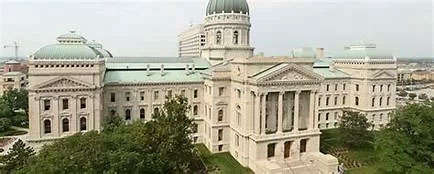 Legislation to provide FFA, 4-H students with excused school absences heads to governor
Legislation to provide FFA, 4-H students with excused school absences heads to governor
 USPS calls for customers to help prevent letter carrier dog bites
USPS calls for customers to help prevent letter carrier dog bites
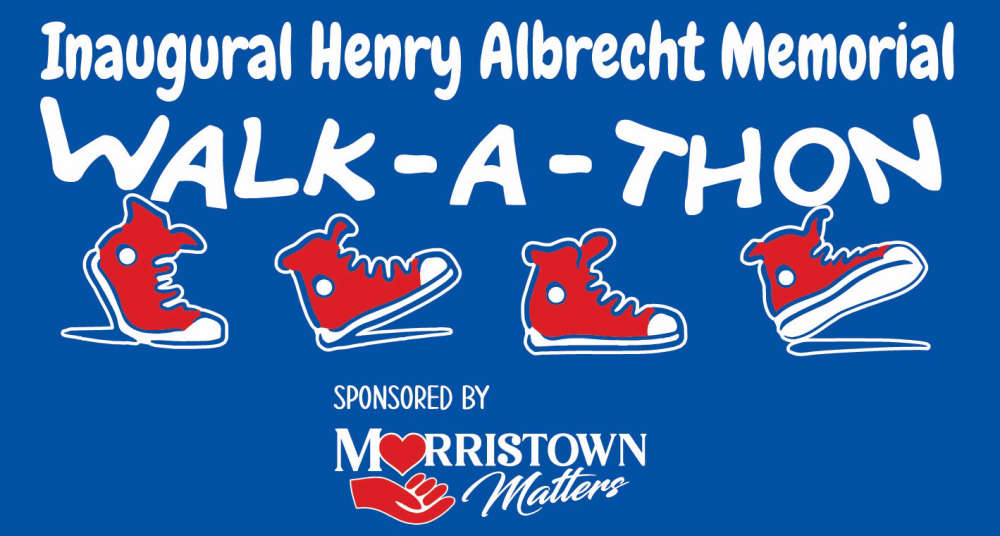 Henry Albrecht Memorial Fund Walk-A-Thon set for April 12
Henry Albrecht Memorial Fund Walk-A-Thon set for April 12
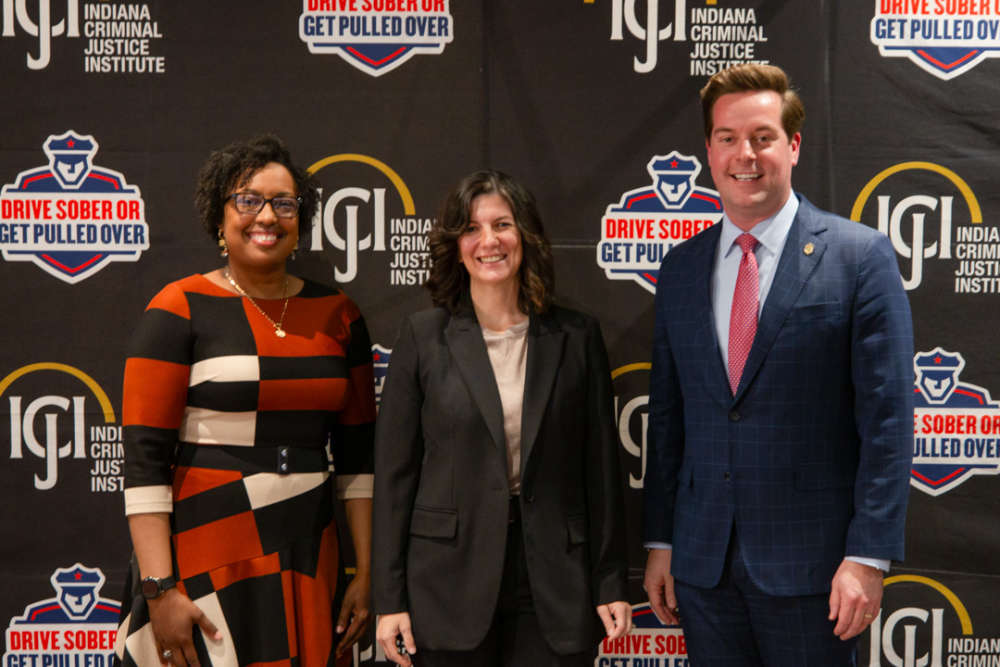 Shelbyville PD's Kyra Peoples among those honored for efforts to reduce drug-impaired driving
Shelbyville PD's Kyra Peoples among those honored for efforts to reduce drug-impaired driving
 Indiana's total labor force hits new peak
Indiana's total labor force hits new peak


